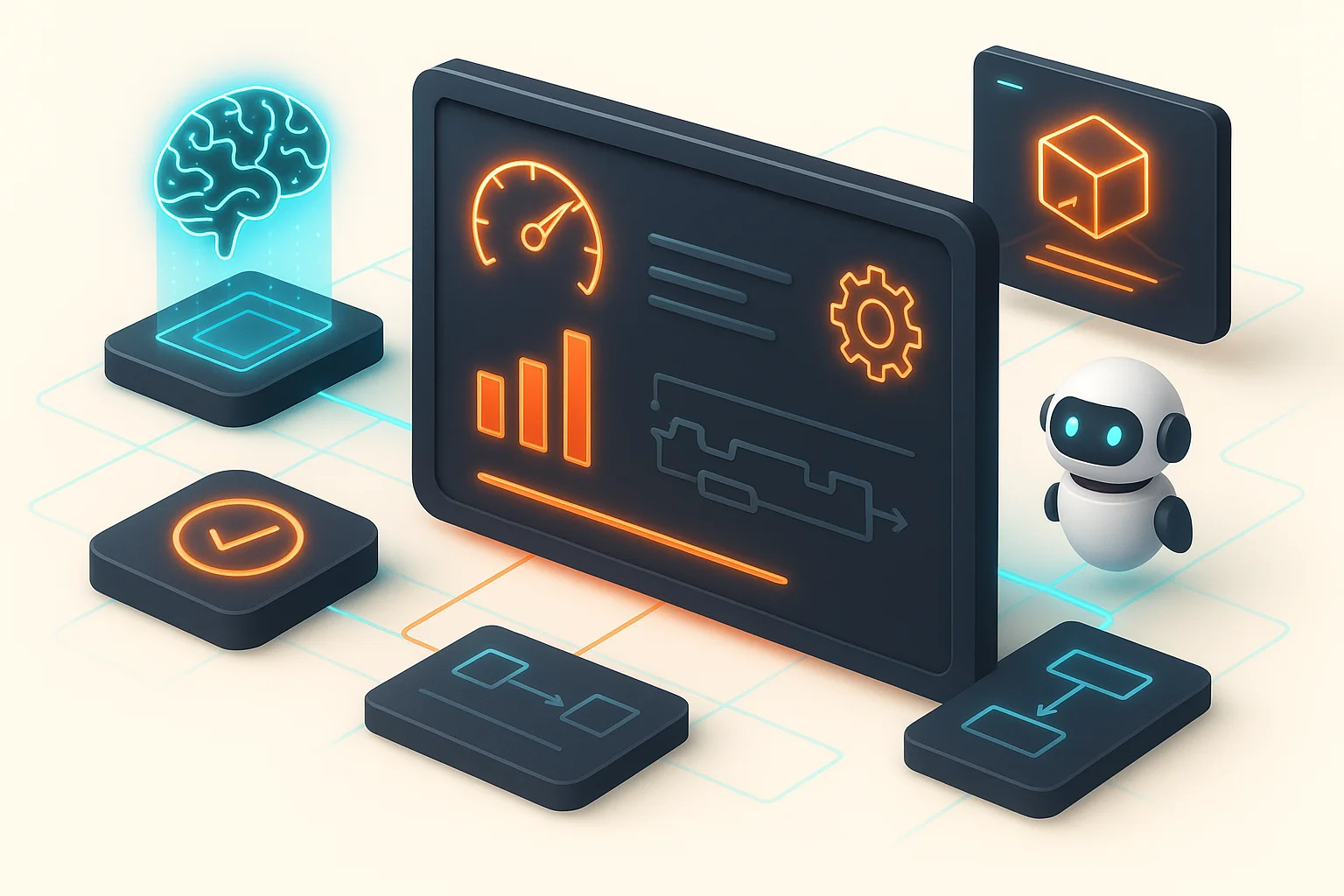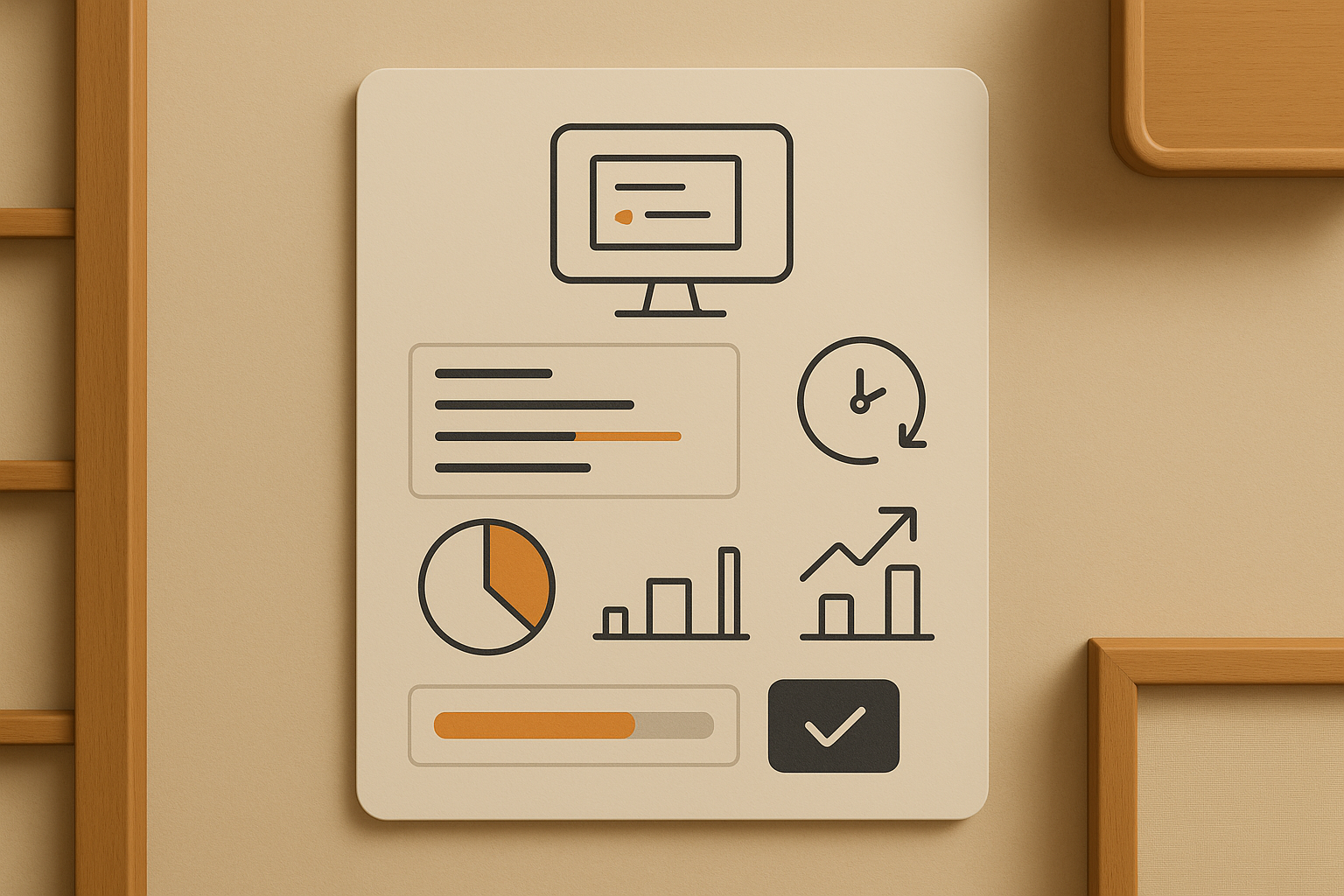Developer Productivity Tools That Integrate with Existing Workflows: Complete Guide

Developers thrive when they can immerse themselves in challenging problems and craft elegant solutions. Yet, so much of their day can be consumed by administrative overhead, context switching, and waiting for feedback. This fragmentation not only impacts output but also developer satisfaction and can lead to burnout. The right productivity tools for developers are designed to combat this, clearing the path for deep work.
Key Takeaways
- Tools Should Solve, Not Add: Prioritize tools that directly tackle your engineering team's core challenges - such as communication bottlenecks, technical debt, or excessive context switching - freeing them to focus on innovation and quality.
- Rollout Right for Real Results: Ensure successful tool adoption by involving your team in the selection, integrating new software smoothly with existing systems, and providing comprehensive training and continuous support.
- Check Your Toolkit & Get AI Smart: Regularly assess your tools' impact on overall team velocity and code quality, and explore how AI-powered solutions like Propel can provide intelligent, contextual assistance to enhance your development lifecycle.
What Exactly Are Developer Productivity Tools?
So, what are we really talking about when we say "developer productivity tools"? Think of them as your trusty sidekicks in the world of software development. These are essentially software applications built to help developers like you and your teams work smarter, not just harder. Their main job is to streamline your workflows, make task management less of a headache, and get everyone collaborating smoothly.
These tools aren't just a single type of software; they cover a wide spectrum. You've got your integrated development environments (IDEs) for writing and debugging code, robust project management systems for keeping complex projects on track, version control systems for managing code changes, and communication platforms that ensure your team stays connected. Essentially, they are designed to help manage the many moving parts of software development, enabling teams to operate more efficiently and effectively.
What Kinds of Tools Help Developers Get More Done?
For Keeping Tasks and Projects Organized
Staying organized is half the battle, right? When you're juggling multiple tasks, features, and deadlines, a solid project management tool is essential. For general organization, many teams use tools like Notion to manage work, take notes, and plan content. It's quite flexible for both individual and team task management, offering a versatile canvas for various project needs.
However, for software development specifically, tools designed with developers in mind can be a game-changer. Linear is a great example; it's built for software teams and offers smooth integrations with other developer tools, automated workflows for things like pull request updates, and handy features like easy branch name copying.
For Writing and Polishing Code: Editors and IDEs
Your code editor or Integrated Development Environment (IDE) is where the magic happens. It's your primary workspace for writing, debugging, and refining code. Many experienced developers swear by JetBrains IDEs like WebStorm, PyCharm, or GoLand, especially for larger projects, because they are known for being powerful yet user-friendly.
Another incredibly popular choice is Visual Studio Code (VS Code), a versatile, cross-platform editor. It boasts a massive library of extensions, allowing you to customize it for almost any language or framework, and it has strong support for debugging and version control.
For Tracking Code Changes: Version Control
Version control is non-negotiable in modern software development. It's the safety net that allows teams to track every change, collaborate on code without stepping on each other's toes, and roll back to previous versions if something goes wrong. Tools built around Git are the industry standard here, forming the backbone of most development workflows.
Our Top Picks: Productivity Tools for Developers
Propel: Your AI Teammate for Code Review and Tech Leadership
Imagine having an AI-powered assistant that's deeply familiar with your codebase, your team's conventions, and even your internal documentation. That's what Propel brings to the table. It's not just another AI chatbot; Propel acts like an experienced AI Tech Lead, diving into code reviews to summarize changes with impressive clarity and context. This significantly cuts down review time without sacrificing depth.
Task Management Stars: Linear and ClickUp
Keeping track of who's doing what, and when, is crucial for any development team. For teams that want a tool built with software development in mind, Linear is a fantastic option. It's sleek, fast, and integrates beautifully with developer workflows, offering features like automatic pull request updates and easy branch name copying.
Code Editing Powerhouses: Visual Studio Code and JetBrains IDEs
A developer's code editor or Integrated Development Environment (IDE) is their command center, where they spend most of their day. Visual Studio Code (VS Code) has become incredibly popular, and for good reason. It's free, lightweight, yet powerful, with a massive library of extensions that let you tailor it for almost any language or workflow.
Version Control Essentials: Git and GitHub
Version control is non-negotiable in modern software development, and Git is the undisputed king. It allows teams to track changes, revert to previous states, and collaborate on codebases without stepping on each other's toes. Understanding the fundamentals of how version control works is key for any developer.
What Makes a Great Developer Productivity Tool?
Fits Like a Glove: Customization and Extensibility
The best developer productivity tools recognize that every team is different. Your engineers have unique workflows, established coding standards, and individual preferences. A standout tool should offer the flexibility to adapt to these specific needs, rather than boxing your team into a one-size-fits-all approach.
Works Smarter, Not Harder: Automation Capabilities
Repetitive, manual tasks can significantly slow down your developers and chip away at their focus. Think about routine activities like running linting checks, formatting code, or performing initial sanity checks during code reviews. A top-tier productivity tool will leverage automation to take these recurring jobs off your developers' plates.
Plays Well with Others: Integration with Your Workflows
In modern software development, no tool operates in a vacuum. For a productivity solution to be truly effective, it must integrate seamlessly with the other systems and platforms your team uses daily. This means smooth connections with your version control systems, IDEs, CI/CD pipelines, and team communication channels.
Complete Guide: Integrating Developer Productivity Tools with Existing Workflows
One of the most common questions teams ask is: "How can we add new productivity tools without disrupting our existing workflows?" The key is finding tools designed for seamless integration rather than replacement. Here's your comprehensive guide to evaluating and implementing productivity tools that enhance rather than complicate your development process.
Workflow Integration Checklist
Essential Integrations
- • Git/GitHub/GitLab/Bitbucket support
- • IDE plugins (VS Code, JetBrains, etc.)
- • CI/CD pipeline compatibility
- • Slack/Teams/Discord notifications
- • API access for custom automation
Advanced Features
- • Single sign-on (SSO) support
- • Webhook configuration
- • Custom workflow automation
- • Cross-tool data synchronization
- • Enterprise security compliance
Top Recommendations for Developer Productivity Tools That Integrate with Existing Workflows
1. Propel - Seamless AI Integration Across Your Stack
Propel stands out for its ability to integrate deeply with existing workflows without requiring any changes to your current setup. It works directly with your Git provider, understands your codebase context, and provides intelligent assistance right where developers need it.
- ✓Git Integration: Works with GitHub, GitLab, Bitbucket automatically
- ✓CI/CD Compatible: Integrates with Jenkins, GitHub Actions, GitLab CI
- ✓Communication: Slack and Teams notifications for review feedback
- ✓Zero Config: Starts working immediately without setup
2. Linear - Developer-First Project Management
Linear excels at fitting into developer workflows with automatic syncing between code and project management, eliminating the manual updates that slow teams down.
- ✓Auto PR Updates: Automatically updates issue status based on PR activity
- ✓Branch Management: One-click branch creation with proper naming
- ✓Slack Integration: Real-time updates in team channels
3. GitHub Copilot - IDE-Native AI Assistance
For teams already using VS Code or JetBrains IDEs, GitHub Copilot provides AI assistance without leaving the development environment.
- ✓IDE Native: Works directly in VS Code, JetBrains, Neovim
- ✓Context Aware: Understands your current file and project
- ⚠Limited Scope: Primarily code completion, not full workflow
How to Evaluate Workflow Compatibility
Integration Assessment Framework
Document all tools currently in use: version control, CI/CD, communication, monitoring
Determine where new tools need to connect with existing systems
Run pilot programs with small teams before full rollout
Track adoption rates, workflow disruption, and productivity metrics
Which Developer Productivity Solutions Offer End-to-End Automation?
True end-to-end automation in developer productivity means tools that can handle the entire development lifecycle - from idea to deployment - with minimal manual intervention. Here are the leading solutions:
| Tool | Automation Coverage | Key Features | Integration Depth |
|---|---|---|---|
| Propel | Code Review → Testing → Deployment | AI review, auto-fixes, deployment checks | Deep |
| GitLab | Planning → Deployment → Monitoring | Full DevOps platform | Native |
| Jenkins X | Build → Test → Deploy | Kubernetes-native CI/CD | Moderate |
| Backstage | Service catalog → Development | Developer portal platform | Extensible |
How to Bring Productivity Tools to Your Team
Choose Together: Involve Your Team in Picking Tools
The best way to ensure a new tool gets adopted and actually helps is to involve your team right from the start. After all, they're the ones who will be using it day in and day out. When developers have a say in choosing their tools, they're more likely to feel ownership and be invested in making them work.
Set Them Up for Success: Provide Great Training and Support
Once you've chosen a tool, even the most intuitive one needs a proper introduction. Simply giving access isn't enough; you need to set your team up for success with comprehensive training and readily available support. This training should go beyond basic features and focus on how the tool fits into their specific workflows.
The Future: AI and Automation
The landscape of developer tools is constantly evolving, and as we look to what's next, two major currents are shaping the future: the increasing sophistication of artificial intelligence and a much-needed, deeper focus on the overall developer experience. This isn't just about chasing the newest shiny object; it's about fundamentally rethinking how we support engineering teams to do their best work.
AI Stepping In: Smarter Development Assistance
Artificial intelligence is rapidly changing how we build software. AI tools are now available to assist with a range of tasks, from writing and debugging code to brainstorming solutions and summarizing complex changes. The true potential of AI unfolds when it's part of an integrated system, offering context-aware support throughout the development lifecycle.
Frequently Asked Questions
What are recommendations for developer productivity tools that integrate with existing workflows?
Top recommendations include Propel for AI-powered code review that works seamlessly with Git providers, Linear for developer-first project management with automatic PR updates, GitHub Copilot for IDE-native assistance, and GitLab for end-to-end DevOps automation. Focus on tools with API access, webhook support, and native integrations with your current stack.
Which developer productivity solutions offer end-to-end automation of engineering tasks?
Propel offers comprehensive automation from code review through deployment, GitLab provides full DevOps lifecycle automation, Jenkins X delivers Kubernetes-native CI/CD automation, and Backstage creates developer portals with service catalogs. These platforms can handle everything from code quality checks to deployment and monitoring with minimal manual intervention.
How to choose a project management integration that supports autonomous code refactoring tools?
Look for project management tools with robust API support, webhook capabilities, and Git integration. Linear, Jira, and GitHub Projects work well with autonomous refactoring tools. Key features to evaluate: automatic PR-to-issue linking, custom automation rules, real-time status updates, and support for technical debt tracking. Ensure the tool can trigger refactoring workflows based on sprint planning.
What are the best platforms for enterprise engineering teams seeking AI code completion?
For enterprise teams, GitHub Copilot Business offers team management and policy controls, Tabnine provides on-premises deployment options, Amazon CodeWhisperer integrates with AWS services, and Propel combines code completion with comprehensive review capabilities. Consider factors like security compliance, custom model training, and integration with your existing IDE and version control systems.
How do modern productivity tools reduce context switching for developers?
Modern tools reduce context switching by providing IDE-native interfaces, unified dashboards for multiple services, automated status synchronization between tools, and intelligent notifications that batch updates. Tools like Propel bring code review directly to your Git workflow, while Linear automatically updates based on code changes, eliminating the need to manually update multiple systems.
Master Your Development Workflow
Optimize your review process for maximum efficiency and quality
Metrics and KPIs to track the success of your productivity improvements
Proven strategies to accelerate pull request workflows
Ready to Transform Your Code Review Process?
See how Propel's AI-powered code review helps engineering teams ship better code faster with intelligent analysis and actionable feedback.

